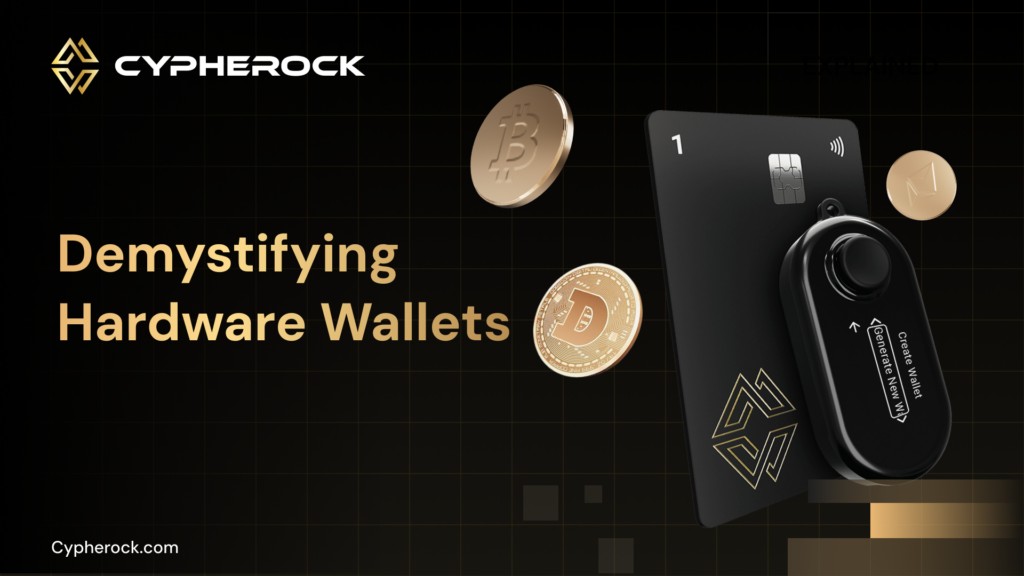

In the vast landscape of cryptocurrency, where digital assets are akin to treasures, safeguarding them is a top priority for enthusiasts. One of the most effective tools in the arsenal of security-conscious users is the hardware wallet. But what exactly is a hardware wallet, and how does it stand as the guardian of your crypto kingdom? Let’s embark on a journey to demystify the essence of hardware wallets, with a special spotlight on Cypherock X1— a revolutionary player in this space.
Understanding the Basics: What is a Hardware Wallet?
A hardware wallet is a specialized physical device designed to secure and store the private keys critical for accessing and managing cryptocurrency holdings. In the realm of digital assets, where security is paramount, hardware wallets stand out as the vanguard against cyber threats. These devices operate offline, minimizing exposure to potential online vulnerabilities, and come equipped with secure elements or chips that isolate and protect the sensitive operations related to private key management. With physical buttons and an external screen, hardware wallets offer a tangible and secure interface for users to interact with their crypto assets, mitigating the risks associated with malware or online attacks. The offline nature of hardware wallets enhances security, providing users with peace of mind as they navigate the complex landscape of cryptocurrency.
Cypherock X1: A Game-Changer in Hardware Wallet Technology:
Now, let’s introduce Cypherock X1 into the narrative—a hardware wallet that transcends conventional norms and redefines the expectations users have for their crypto security.
Dual Chip Architecture:
Cypherock X1 boasts a dual chip architecture for offline computation and verification. This not only enhances the overall security of the device but also sets it apart from traditional hardware wallets. The dual chip design serves as a fortress for your private keys, ensuring that even in the face of sophisticated attacks, your crypto assets remain impenetrable.
Private Key Decentralization:
Cypherock X1 leverages the power of Shamir Secret Sharing, a cryptographic method that decentralizes private key security. By splitting the private key into multiple parts and distributing them across the device’s components (including X1 Cards and X1 Vault), Cypherock X1 eliminates the vulnerability associated with a single point of failure. Losing one or even two components doesn’t jeopardize the security of your funds.
CySync App:
Cypherock X1 isn’t just a hardware wallet; it’s a comprehensive solution for managing your entire crypto kingdom. The CySync app, seamlessly integrated with Cypherock X1, allows users to track, manage, and interact with their diverse portfolio of cryptocurrencies. With support for 9000+ coins and tokens, including major players like BTC, ETH, MATIC, and DOGE, Cypherock X1 provides a versatile environment for crypto enthusiasts.
Beyond Cold Storage:
Cypherock X1 isn’t content with being just a secure vault for your crypto assets; it’s designed to cater to the needs of advanced users. Supporting up to 4 different wallets within the same device, Cypherock X1 lets users allocate different profiles for NFTs, DeFi assets, BTC, or even utilize the additional wallets for seed phrase backups. It’s a holistic solution that transcends the limitations of traditional hardware wallets. Users can also manage multiple wallet portfolios in a single app - cySync, designed by Cypherock.
Email 2FA: Elevating Authentication to the Next Level:
One of the standout features of Cypherock X1 is its integration of Email 2FA within the CySync app. This not only adds an extra layer of authentication but provides users with a means to verify the authenticity of their device even in the event of a compromised computer. Cypherock X1 is not just about protecting your private keys; it’s about safeguarding every aspect of your crypto experience.
Conclusion:
In the grand tapestry of cryptocurrency security, hardware wallets emerge as indispensable sentinels guarding the gates to your digital kingdom. Cypherock X1, with its dual chip architecture, Shamir Secret Sharing, and advanced features, stands as a trailblazer in this domain. It goes beyond the conventional definition of a hardware wallet, offering users a comprehensive solution that aligns with the evolving needs of the crypto landscape.
So, the next time you think about fortifying your crypto holdings, envision Cypherock X1 as the stalwart guardian standing watch over your digital treasures. It’s not just a hardware wallet; it’s a sentinel—a defender of your crypto kingdom in the vast and ever-evolving realm of digital assets.

We are live for orders @ www.cypherock.com/product/cypherock-x1
Connect with us:
Twitter: twitter.com/CypherockWallet
Telegram: t.me/cypherock
